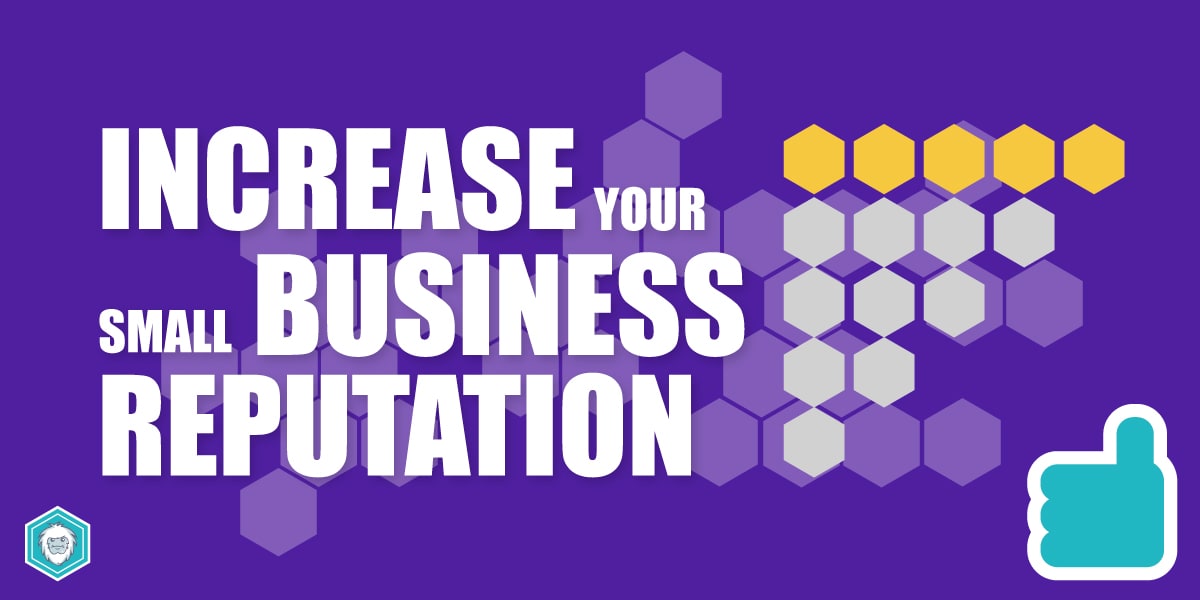How to Improve Your Small Business’s Reputation Online: A Complete Guide
Building and maintaining a strong online reputation is required for small businesses to succeed. With most consumers researching businesses online before making purchasing decisions, having a positive online presence can set your small business apart from competitors, build trust, and drive sales.
This guide covers actionable steps and strategies for improving your small business’s online reputation.

Why Your Online Reputation Matters
The reputation of a small business can greatly influence its success. Studies show that around 90% of consumers read online reviews before visiting a business, and 84% trust online reviews as much as personal recommendations. For small businesses, which often compete with larger companies, a strong reputation can be a powerful differentiator. A positive online reputation helps establish credibility and attract new customers while also increasing customer loyalty, ultimately driving growth and boosting profitability.
Key Strategies to Improve Your Small Business’s Online Reputation
Improving and maintaining your small business’s online reputation takes considerable time and effort, so be prepared to put the work in. If you’re unsure where to start, here are a few strategies that can help you establish a trustworthy, positive online presence.
1. Build and Monitor Online Reviews
Online reviews on sites like Trustpilot, Yelp, and blogs are often the first thing potential customers see when they search for your business online. This makes customer reviews an essential part of your online reputation.
Responding to reviews in a timely manner can create a more favourable impression, address any negative experiences, and feel empowered to shape your online presence.
- Encourage Positive Reviews: Ask satisfied customers to leave a review on platforms that your target audience frequents, like Google, Yelp, or Facebook. You are going to want to make it easy for customers to write a review by providing a direct link and remind customers of how valuable their feedback is to your business.
- Respond to Reviews: Always respond to both positive and negative reviews quickly, thanking customers for their feedback while addressing any concerns they might have, helping demonstrate that you’re committed to providing excellent service.
- Use Review Management Tools: Tools like Google My Business and Trustpilot help small businesses monitor reviews across multiple platforms, making it easier to respond promptly and manage their online presence.

2. Optimize Your Business’s Social Media Presence
Social media plays an influential role in public perception of your brand, making it an essential platform for building a strong online reputation.
- Stay Active on Social Media: Regularly post updates, showcase your products, highlight positive customer experiences, and promote your brand’s values to strengthen your social media presence across platforms like Facebook, Instagram, TikTok and LinkedIn.
- Engage with Your Audience: Remember to respond quickly to any comments and messages you receive. Interact with your customers in a friendly yet professional manner, addressing questions or concerns they have. Engaging with your audience shows that you’re attentive and genuinely care about their needs.
- Showcase Customer Testimonials: Share positive customer stories, testimonials, or reviews on your social media accounts. Doing this helps you reinforce your reputation and build trust with potential customers as a reliable and customer-focused business.
3. Create High-Quality, Informative Content
Content marketing can play a vital part of the puzzle in establishing your brand’s credibility and expertise in your industry. Providing helpful, relevant information not only attracts new customers but also improves how your business is perceived online.
- Publish Blog Posts: Create blog posts that address common questions, provide industry insights, and showcase your expertise. For example, a small bakery could share recipes or baking tips, while a local gym could publish fitness guides.
- Utilize Video Content: Videos are a highly engaging content form and can be used to demonstrate products, introduce team members, or offer educational content related to your industry.
- Optimize Content for SEO: Ensure your content is optimized for search engines. Target relevant search intent-optimized keywords, use clear headings, and provide valuable information. Using tools like SEMrush, Ahrefs and Frase can help your website rank higher in search results and make it easier for potential customers to find you online.

4. Leverage Customer Testimonials and Case Studies
Positive customer testimonials and case studies are powerful tools for building trust and showcasing the value of your products or services.
- Display Testimonials on Your Website: Dedicate a section of your website to showcasing customer testimonials that are authentic, specific, and highlight how your business met customers’ needs.
- Create Case Studies: For B2B small businesses, case studies can provide an in-depth look at how your business solved a particular problem for a client, helping to build credibility and demonstrate your expertise.
- Share Customer Success Stories on Social Media: Social proof is an effective way to improve your business’s online reputation; sharing happy customer stories and testimonials on social media shows potential customers that your business delivers positive results.
5. Implement Strong Customer Service Practices
Customer service is a significant factor in your business’s reputation. Satisfied customers are more likely to leave positive reviews, recommend your business, and become loyal patrons.
- Train Your Team: A well-trained customer service team that has the tools it needs to resolve issues quickly and professionally provides an advantage over some competition.
- Set Up a Customer Support System: Offer multiple ways for customers to contact you, such as phone, email, or live chat. Using an AI chatbot can help respond promptly to inquiries and address complaints proactively to maintain a positive image 24/7.
- Follow-Up After Purchases: Reach out to customers after their purchase to ensure they’re satisfied and encourage them to provide feedback. This is easy to add to your workflow, helping improve customer satisfaction and prevent potential issues from escalating.
6. Use Online Reputation Management Tools
Online reputation management (ORM) tools can help small businesses track and manage their online presence, making it easier to address negative feedback and stay informed about public perception.
- Reputation Monitoring Tools: Tools like Google Alerts and Hootsuite allow you to monitor mentions of your business across the web, helping you stay on top of feedback and respond quickly.
- Review Management Software: Platforms like Yext streamline review management, making it easy to track and respond to customer reviews.
- Sentiment Analysis: Some tools offer sentiment analysis, which analyzes the tone of customer feedback. This can help you understand overall customer sentiment and address any negative perceptions proactively.

7. Engage in Community Involvement
Small businesses can enhance ther reputation by partaking in community groups, local activities and events showing that profit margins aren’t the only thing they care about.
- Sponsor Local Events: Sponsoring or participating in local events gives you positive exposure and creates goodwill among local customers.
- Partner with Charities: Partnering with a local charity or donating profits to a good cause can help strengthen your brand’s reputation, showing that you’re committed to making a positive impact.
- Encourage Customer Involvement: Invite customers to participate in community initiatives, such as food drives, charity events, or volunteer activities. This involvement fosters stronger relationships and promotes a positive image.
8. Respond Professionally to Negative Feedback
Negative reviews are all part of the parcel of running a small business; these negatives can be a great opportunity to demonstrate the effectiveness of your customer service and commitment to improvement.
- Stay Calm and Professional: Responding calmly and professionally to criticism shows that you respect customer feedback and are open to improvement.
- Apologize and Offer Solutions: Remember the customer is always right(ish). If a customer has had a negative experience with your business, ensure you apologize sincerely and offer a solution or compensation if appropriate. Showing empathy can turn a dissatisfied customer into a loyal one.
- Take Conversations Offline: For complex issues, suggest moving the conversation offline by providing a phone number or email address. This prevents misunderstandings and helps resolve issues more effectively.
Key Benefits of a Strong Online Reputation
A positive online reputation can benefit your small business in several ways:
- Increased Customer Trust: The more positive reviews you have, the more likely it is that customers will trust your business.
- Higher Sales and Conversions: Customers feel more confident purchasing from a trustworthy business with a strong reputation.
- Improved Search Engine Rankings: Search engines prioritize businesses with positive reputations, meaning a good online reputation can lead to higher visibility in search results.
- Attracting New Customers: To make your business more attractive to potential customers, ensure you have positive reviews and high-quality content and are engaging with your audience on social media.
- Stronger Customer Loyalty: Customers who have positive experiences with your brand are more likely to become repeat customers, which is essential for long-term growth.
Final Tips for Managing Your Online Reputation
Managing your online reputation requires consistent effort, but these final tips can make it easier:
- Monitor Regularly: Set aside time each week to review feedback, track mentions, and check reviews.
- Encourage Customer Feedback: Actively seek feedback from customers to identify areas for improvement.
- Stay Authentic: Always be genuine in your interactions and avoid using fake reviews or misleading claims.
- Continuously Improve: Use customer feedback data to make improvements to your products and customer service, which in turn will increase your customer experience and reputation.
Conclusion: Take Charge of Your Small Business’s Online Reputation
Your small business’s online reputation is a key part of its success now and in the future.
You can ensure that your business online reputation now and in the future continues to be positive by:
- Actively managing online reviews
- Optimizing your social media presence
- Creating valuable content
- Focusing on customer service
Do all of these and you can build a strong, positive reputation that attracts new customers and fosters loyalty.
Improving your business’s online reputation takes time, but the effort is well worth it. A positive reputation builds trust, improves customer relationships, and ultimately supports your business’s growth and sustainability. Start implementing these strategies today to take control of your small business’s online reputation and set it up for lasting success.




